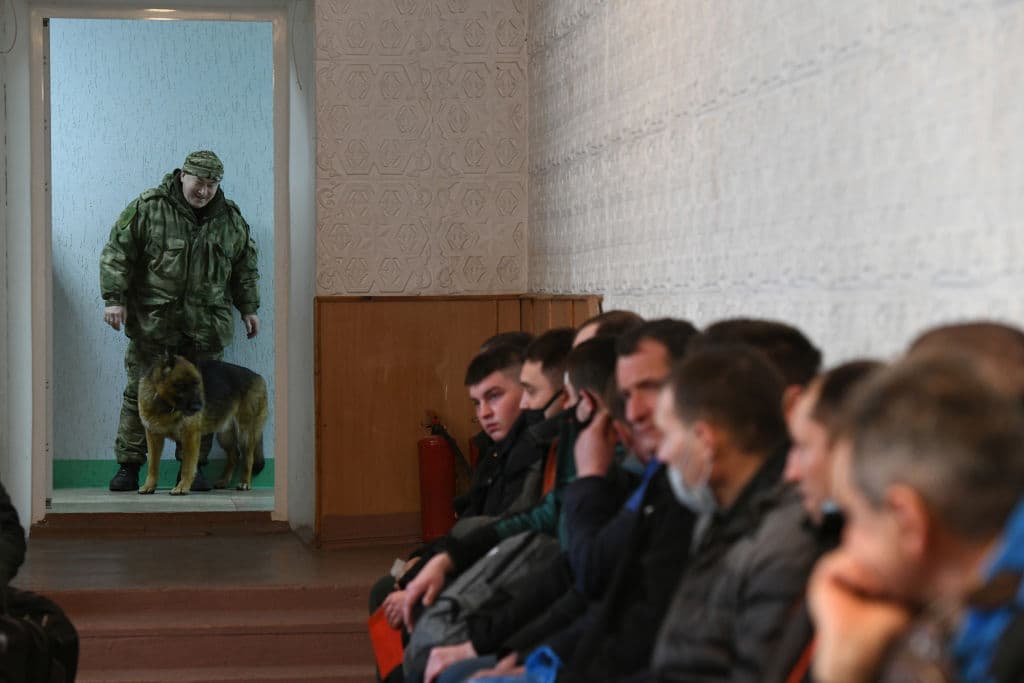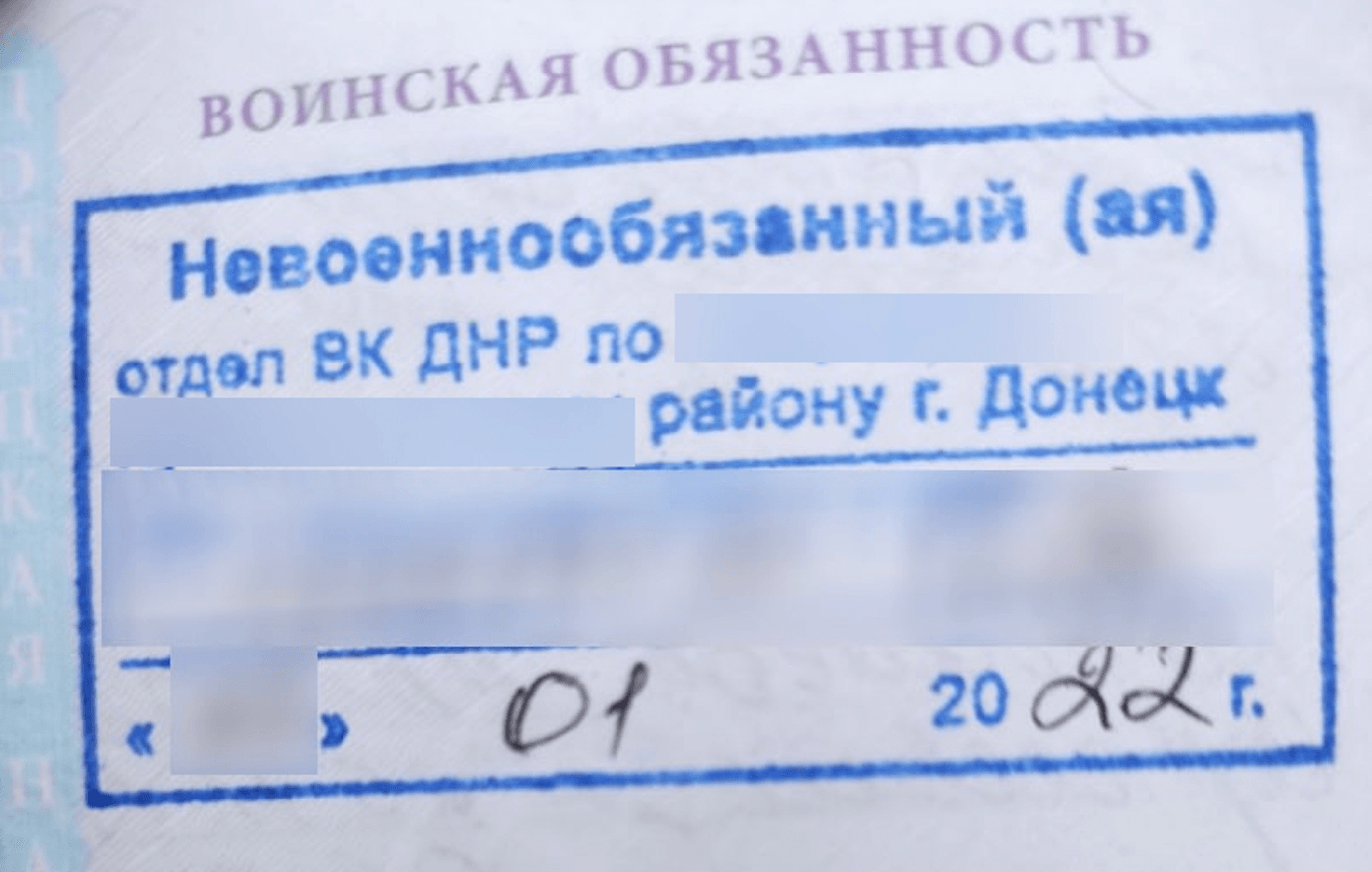EXCLUSIVE: Escaping forced conscription in Russian-occupied Donetsk

Editor’s Note: The names of the people interviewed by the Kyiv Independent for this story have been changed to protect their identity as they have shared sensitive information that could place them and their families in danger.
Stepan didn’t see daylight for nearly four months.
Since mid-February, even before Russia’s full-scale invasion of Ukraine began, many men of conscription age in Russian-occupied Donetsk, the largest city in Ukraine’s Donbas region, went into hiding, fearing what might happen if they stepped outside.
Many of those who dared to walk out were grabbed by local Kremlin-controlled militants and forcibly sent to the front lines to fight against Ukraine. Most of them were sent without any training, equipment, or combat experience.
According to residents who spoke to the Kyiv Independent, the city’s streets began to empty about a week before Russia launched its full-scale invasion on Feb. 24. By then, Russian-led militants had already announced a large-scale, forced conscription campaign targeting men between the ages of 18 and 55 in the eastern Ukrainian region they had occupied since 2014.
People started to look for ways to leave the already depopulated city. Several different schemes to smuggle people out emerged just days after men were forced to pick up arms. All of them dangerous and costly.
Read also: EXCLUSIVE: Inside Ukraine’s covert operation to take out elite Wagner Group mercenaries in Donbas
Stepan, a former resident of Donetsk, told the Kyiv Independent he was able to leave after his friends recommended an expensive, yet reliable, guide.
"I fled because it became unrealistic and dangerous to live in Donetsk. You can't go outside because of forced conscription. There is no water, no work," he said.
Stepan is among the lucky few to have left. Thousands of other men, living in regions occupied by Russian-controlled militants since 2014, have not been so fortunate.
Cannon fodder
The streets of once-busy Donetsk now look empty. In 2014, hundreds of thousands fled Donetsk as Russia took hold of the once prosperous city with a pre-war population of one million. In 2022, a new exodus is taking place as men are fleeing forced conscription.
When local militants began forcibly drafting men from the occupied region in mid-February, some men voluntarily showed up at military registration offices after receiving a notice, believing it was just a formality. It wasn’t.
Read also: Russia throws untrained civilians from occupied Donbas into hot spots of its war in Ukraine
Once the full-scale invasion of Ukraine started on Feb. 24, Russia used the newly conscripted men from occupied Donbas as cannon fodder in their offensive in eastern Ukraine.
As people stopped showing up at the registration offices, militants began grabbing people right off the streets and bringing them in. Men of conscription age virtually disappeared from the streets, keeping out of sight by staying at home.
"I never went outside. Others were less lucky. People I knew were snatched straight from work or school. Almost immediately they were sent to the (war’s) hot spots," Stepan said.
Many, including Stepan, began looking for a way out of occupied territories.
Getting out
With the battles raging west of Donetsk, the only way out is going east through Russia. Most of the time getting out requires knowing someone who can escort you through the border.
Stepan says the first time you call "the guide," you need to say you’re looking for transportation documents. He says the guide he called was nervous and was afraid of discussing the details on the phone.
"You found me, so you've been told (how it works)," the guide told Stepan.
The guide scheduled the day of the trip. When the day came, he called in the morning and told Stepan the departure time. The car arrived straight at the entrance to Stepan’s residential building so that Stepan wouldn't be seen outside.
The militants at the border were in on the scheme and let them pass. Stepan paid a total of 60,000 rubles, equivalent to around $900.
At the Russian border, he was interrogated by the Federal Security Service for several hours. He had to fill out a detailed form about who he was and give up all his social media passwords before eventually being let into the country.
Stepan is now safe in Sweden.
The Kyiv Independent spoke to two other men, Maksym and Yaroslav, who left Donetsk through a similar arrangement. (Editor’s note: The names have been changed to protect their identity.)
"If you leave by car, the guide drives. Often these guides are militants dressed as civilians," Maksym, who left in June for Rostov, told the Kyiv Independent.
If several people gather for the trip, the cars line up in a column and make their way to the border. The guide’s car usually has a special pass on the windshield.
With the pass, the car won't be stopped at checkpoints on the way to the border.
According to Maksym, some people leave on their own, bypassing checkpoints through fields. He said that in most cases if a person attempting to flee is stopped at a checkpoint, they can pay a bribe on the spot and get out.
Success depends on your wallet, communication skills, and the mood of the militant, Maksym said.
Maksym added that initially, the price to be smuggled out in a packed truck was as low as 20,000 rubles ($370) per person. As the war raged on, the prices increased.
From the early days, it was possible to also obtain a "reservation” at work, which said that the employer requires you to continue your duties at work. This exemption allowed many people to escape mobilization and leave the occupied territories early on.
Read also: Mariupol evacuees: ‘People just dying, city in chaos’
But after the mass departure of people with the work exemption, those obtaining a "reservation" were no longer allowed into Russia.

As the war progresses, the window to escape the region narrows as the prices skyrocket, militants at checkpoints become stricter, and the middlemen known as guides, get arrested.
"In one of the first attempts to leave, I called a guide and a woman answered telling me that the person was in jail," Stepan recalls.
Another way to escape conscription is to be labeled unfit for service. That is also becoming more expensive to do.
Yaroslav, who left Donetsk in July and was able to move to Portugal, told the Kyiv Independent that he paid $350 in January to have his documents stamped with an “unfit for service” mark.
Today, he says, such a stamp would cost $2,600.
"Few people can afford to pay this," said Yaroslav, who had no problem entering Russia with an “unfit for service” stamp.
An explicit war crime
Forced conscription in occupied territories constitutes a war crime according to the Geneva Conventions. It also violates the Rome Statute of the International Criminal Court.
According to human rights activists, Russia has forcibly mobilized up to 100,000 residents of the occupied territories of Donetsk and Luhansk oblasts. Many of them have already been killed.
According to the Eastern Human Rights Group, the number of those killed is north of a quarter of those mobilized.
"Forced conscription is sending people to die," Gunduz Mamedov, former deputy prosecutor general, and expert on international humanitarian law, told the Kyiv Independent.
“In Ukraine, forced conscription can lead to up to 12 years in prison (for people involved in the conscription), and if this leads to the person being killed, it is a life sentence (for the perpetrator)," Mamedov said.
Read also: Over 50 Ukrainian prisoners of war killed in Russian captivity
Yet it’s hard to enforce these laws, says Alyona Luneva, director of advocacy at Ukraine’s ZMINA human rights center.
"Ukraine cannot do anything to prevent the forced conscription in the occupied territories," Luneva told the Kyiv Independent.
"Just like with deportation, Ukraine has no legal mechanisms to prevent forced mobilization in occupation.”
This is what Stepan now fears the most. Low on cash and options, his father and friends are still stuck in Russian-occupied Donbas, facing the possibility of forced conscription.










